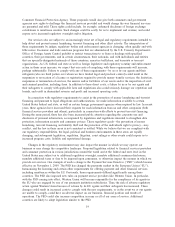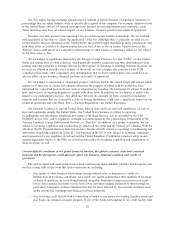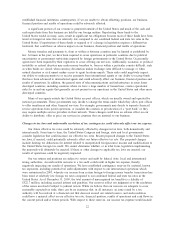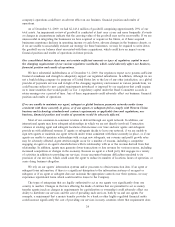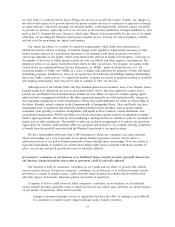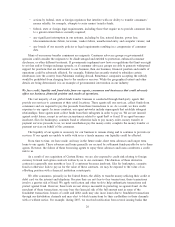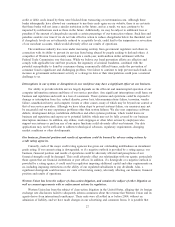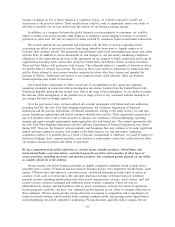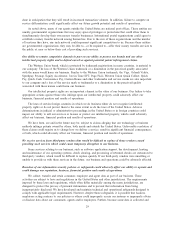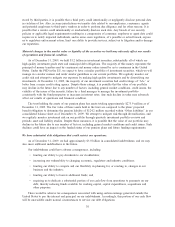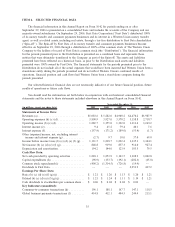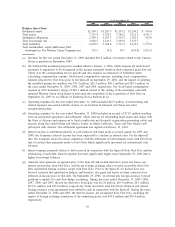Western Union 2009 Annual Report Download - page 40
Download and view the complete annual report
Please find page 40 of the 2009 Western Union annual report below. You can navigate through the pages in the report by either clicking on the pages listed below, or by using the keyword search tool below to find specific information within the annual report.• actions by federal, state or foreign regulators that interfere with our ability to transfer consumers’
money reliably, for example, attempts to seize money transfer funds;
• federal, state or foreign legal requirements, including those that require us to provide consumer data
to a greater extent than is currently required;
• any significant interruption in our systems, including by fire, natural disaster, power loss,
telecommunications failure, terrorism, vendor failure, unauthorized entry and computer viruses; and
• any breach of our security policies or legal requirements resulting in a compromise of consumer
data.
Many of our money transfer consumers are migrants. Consumer advocacy groups or governmental
agencies could consider the migrants to be disadvantaged and entitled to protection, enhanced consumer
disclosure, or other different treatment. If governments implement new laws or regulations that limit our right
to set fees and/or foreign exchange spreads, or if consumer advocacy groups are able to generate widespread
support for positions that are detrimental to our business, then our business, financial position and results of
operations could be adversely affected. For example, Pakistan has recently started to subsidize certain
remittances into the country from Pakistanis working abroad. Remittance companies accepting the subsidy
would be prohibited from charging fees to the sender or receiver. While the geographical extent and other
details are being determined, it is an example of governmental intervention in our industry.
We face credit, liquidity and fraud risks from our agents, consumers and businesses that could adversely
affect our business, financial position and results of operations.
The vast majority of our global funds transfer business is conducted through third-party agents that
provide our services to consumers at their retail locations. These agents sell our services, collect funds from
consumers and are required to pay the proceeds from these transactions to us. As a result, we have credit
exposure to our agents. In some countries, our agent networks include superagents that establish subagent
relationships; these agents must collect funds from their subagents in order to pay us. We are not insured
against credit losses, except in certain circumstances related to agent theft or fraud. If an agent becomes
insolvent, files for bankruptcy, commits fraud or otherwise fails to pay money order, money transfer or
payment services proceeds to us, we must nonetheless pay the money order, complete the money transfer or
payment services on behalf of the consumer.
The liquidity of our agents is necessary for our business to remain strong and to continue to provide our
services. If our agents are unable to settle with us in a timely manner, our liquidity could be affected.
From time to time, we have made, and may in the future make, short term advances and longer term
loans to our agents. These advances and loans generally are secured by settlement funds payable by us to these
agents. However, the failure of these borrowing agents to repay these advances and loans constitutes a credit
risk to us.
As a result of our acquisition of Custom House, we are also exposed to credit risk relating to foreign
currency forward and option contracts written by us to our customers. The duration of these derivative
contracts is generally nine months or less. If a customer becomes insolvent, files for bankruptcy, commits
fraud or otherwise fails to pay us for the value of these contracts, we may be exposed to the value of an
offsetting position with a financial institution counterparty.
We offer consumers, primarily in the United States, the ability to transfer money utilizing their credit or
debit card via the internet and telephone. Because they are not face-to-face transactions, these transactions
involve a greater risk of fraud. We apply verification and other tools to help authenticate transactions and
protect against fraud. However, these tools are not always successful in protecting us against fraud. As the
merchant of these transactions, we may bear the financial risk of the full amount sent in some of the
fraudulent transactions. Issuers of credit and debit cards may also incur losses due to fraudulent transactions
through our distribution channels and may elect to block transactions by their cardholders in these channels
with or without notice. For example, during 2007, we received notification from several issuing banks that
26





